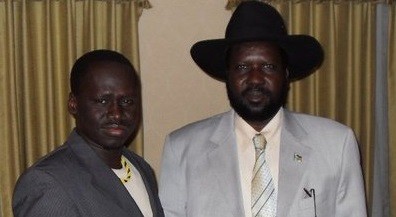Ambassador Gordon Buay, a senior official at the South Sudanese embassy in Washington, DC, says that an opinion article published in The New York Times in the names of Salva Kiir and Riek Machar is authentic. He refutes denials from the first vice president’s office in Juba, calling them political machinations to appease supporters who were angry over the opinion piece.
The New York-based newspaper has yet to come out with any clarifications as to why it published the article in the name of Riek Machar without seeking his personal permission to do so. Machar’s spokesman says he never even saw the article, which criticizes plans for a hybrid court to try war criminals in South Sudan.
Ambassador Gordan Buay, who is in charge of consular and community services at the embassy in Washington, DC, today challenged Machar to speak for himself about the matter rather than working through spokesmen, questioning why he never yet called a press conference about it if indeed he did not agree to publication of the article in newspaper, which also operates a website accessible globally.
“Our president and the first vice president agreed and they wrote the article. After they agreed and they wrote the article then the spokesman of the presidency – that is Ateny Wek Ateny – sent two copies. He sent one to New York Times and he sent one to us. And then The New York Times since it came from the Government of South Sudan and we have been in contact with them and then they published it,” he said.
“It is authentic, it is true,” added Buay, speaking to Radio Tamazuj by phone from Washington.
“So what Riek Machar’s people are saying… is just only a political deception from their supporters because they are getting a lot of criticism from their supporters, so they are trying to bail out Dr. Riek from this criticism. But the truth is that, yes, this was agreed by the two leaders and then it was sent [by] Ateny Wek Ateny [who] put us in picture and then it was given to New York Times. That was the reason New York Times published it.”
“The truth is both the principles agreed to writing the article,” he stressed.
On the other hand, James Gatdet Dak, Machar’s spokesman, told Radio Tamazuj that the document published by the news outlet is “false,” saying Machar has no desire to drop the hybrid court from the peace agreement.
“Dr. Machar is not aware about this document which was published by The New York Times and Radio Tamazuj as well,” said Dak. “SPLM/SPLA (IO) leadership is committed to the implementation of justice and accountability mechanism as signed in the August 2015 peace agreement.”
Buay, asked whether the embassy had contacted the office of the First Vice President before submitting the article to the newspaper said, “No, there is nothing like that… if you read the [peace] agreement and the way the transitional government of national unity is formed, we have a collegial presidency. And the meaning of colleagial presidency is that every decision taken by the president he must consult the First Vice president and the Vice President.”
“So what exactly happened is that President Kiir consulted with the First Vice President and Dr. Riek Machar is in agreement. Can you tell me if Dr. Riek Machar is not in agreement he could have called a press conference himself?”
“The reason why Gatdet Dak [Machar’s spokesman] and Dhieu Mathok [the secretary-general of Machar’s party] are denying this is for public relations reasons, because their supporters are very angry – they have to save their leader,” he said.
Buay said that SPLM-IO supporters are in an “outcry” over the article.
“The public should accept what Ateny Wek is saying… since he is the spokesman of the presidency speaking on behalf of the presidency his word is enough, is credible, you people in the media should accept that.”
File photo: Gordan Buay (left) with Salva Kiir (right)




